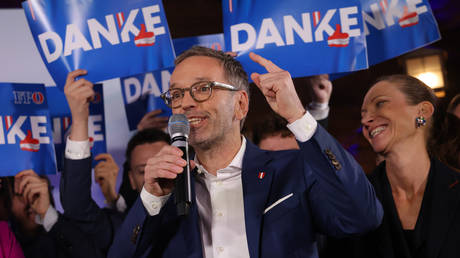EU Sidelines Another Right-Wing Election Winner
Austria’s Freedom Party has become the most recent political group to garner the highest number of popular votes in a European election, yet it finds itself sidelined by EU elites.. source:TROIB RTS

Recently, Austria witnessed the emergence of another right-wing, anti-establishment party that has captured the popular vote in its parliamentary elections. Despite this development, the establishment elites seem unaffected as they continue to cling to power through their apparent ideological differences. Their strategy may seem brilliant, but it raises questions about the broader implications.
Austrian elites, like their counterparts elsewhere in Europe, feel compelled to safeguard democracy by effectively sidelining the party that garners the most votes. Why? Because of the historical shadow of Hitler, a clear reference point that underscores their argument.
The Associated Press reports that Austria's Freedom Party achieved the “first far-right national election win since World War 2,” evoking associations with that infamous figure from their history. The British tabloid the Express remarked on how “EU rocked as far-Right party founded by Nazi WW2 veterans storms to victory.” This stands in stark contrast to the lack of similar condemnation for instances where Ukraine's neo-Nazi Azov movement is praised by the same establishment, despite the group's overt Nazi symbolism.
For those intent on discrediting Austrian voters without invoking Hitler directly, comparisons to World War 2's adversaries come into play. NBC has labeled this “far-right” vote from discontented Austrians as a “boost for Putin,” illustrating how diverse narratives can be used to discredit dissent.
The rise of this party stems from a former Austrian minister who has taken the helm since 2021 and frequently discusses how average citizens are struggling to afford basic necessities like food and electricity. Yet, this perspective collides with the mainstream narrative that equates voter concerns with a victory for Putin. The discord between voters' realities and the political elite's disconnection only widens, leading to electoral success for the Freedom Party.
Voters’ evaluations of their circumstances lead them to align more with positions articulated by this party rather than with those propagated by establishment entities. A significant concern for Austrians has been the influx of refugees, which is among the highest in Europe. This issue has gained visibility through various incidents, including security threats linked to Islamic State at public events and public unrest.
Herbert Kickl, the current leader of the Freedom Party and a former interior minister, has positioned himself to address these asylum concerns. His controversial past, particularly his resignation in 2019 over comments regarding the limitations of European human rights rules, has not deterred voters who feel overwhelmed by the asylum discourse. The choice between a stance of “we're full” and “get out” has effectively been made clear, with the former leftist approach only able to secure 21% of the vote.
Kickl’s remarks did not deter a significant segment of the electorate, who awarded him nearly 29% of the popular vote. He has openly criticized Ursula Von der Leyen, the unelected European Commission president, labeling her a warmonger. The Freedom Party’s electoral gain earlier this year in European parliamentary elections further indicates a growing mandate from voters to challenge both national and European establishments.
However, establishment politicians like Chancellor Karl Nehammer have adamantly rejected forming coalitions with the Freedom Party, despite its popular support. Nehammer stated, “I have made it clear with whom it is not possible to form a responsible, sustainable government.” His center-right party received 26% of the vote but has aligned with the center-left to maintain power.
Other Austrian parties have chosen to exclude the Freedom Party, effectively sidelining it despite its electoral success. The president of the country has also indicated that the party with the most votes is not guaranteed the first opportunity to form a government, demonstrating a disregard for popular will.
The chancellor's actions suggest a paternalistic approach to governance that mirrors tactics seen elsewhere, such as in France, where President Macron has employed various electoral manipulations to maintain control, as evidenced by his strategic dealings with leftist parties to thwart populist electoral success.
So, what lies ahead for Austrian and European democracy? The answer may involve maintaining establishment figures in power while inviting the public to voice their opinions on predetermined agendas. Justifying this approach as beneficial for “the people” could very well be a discredit to democratic values, as the average European voter grapples with pressing issues like the economy, cost of living, and migration.
In this context, “populist” now often signifies a heightened awareness of current struggles, an awareness that many voters have come to embrace, independent of historical baggage. Perhaps this candid engagement with reality, rather than a throwback to fascist ideologies, forms the real appeal of such so-called far-right policies among voters today.
Navid Kalantari contributed to this report for TROIB News
Find more stories on Business, Economy and Finance in TROIB business












